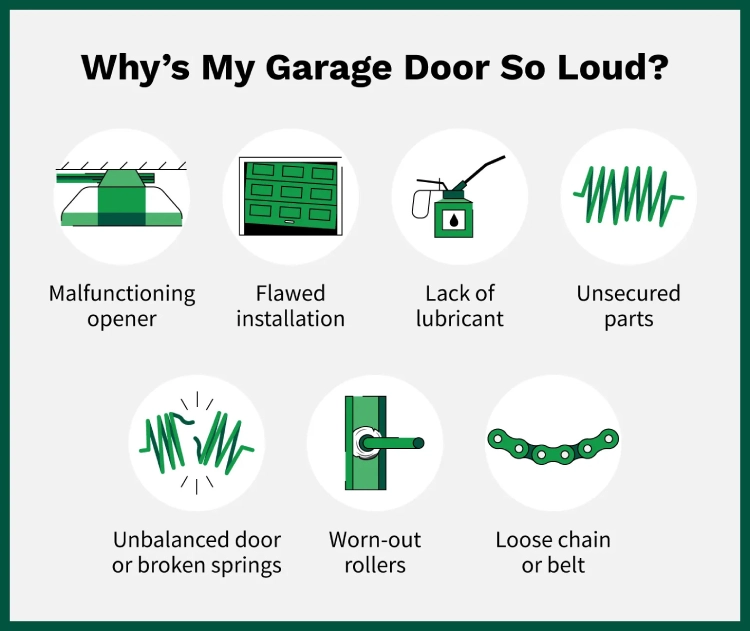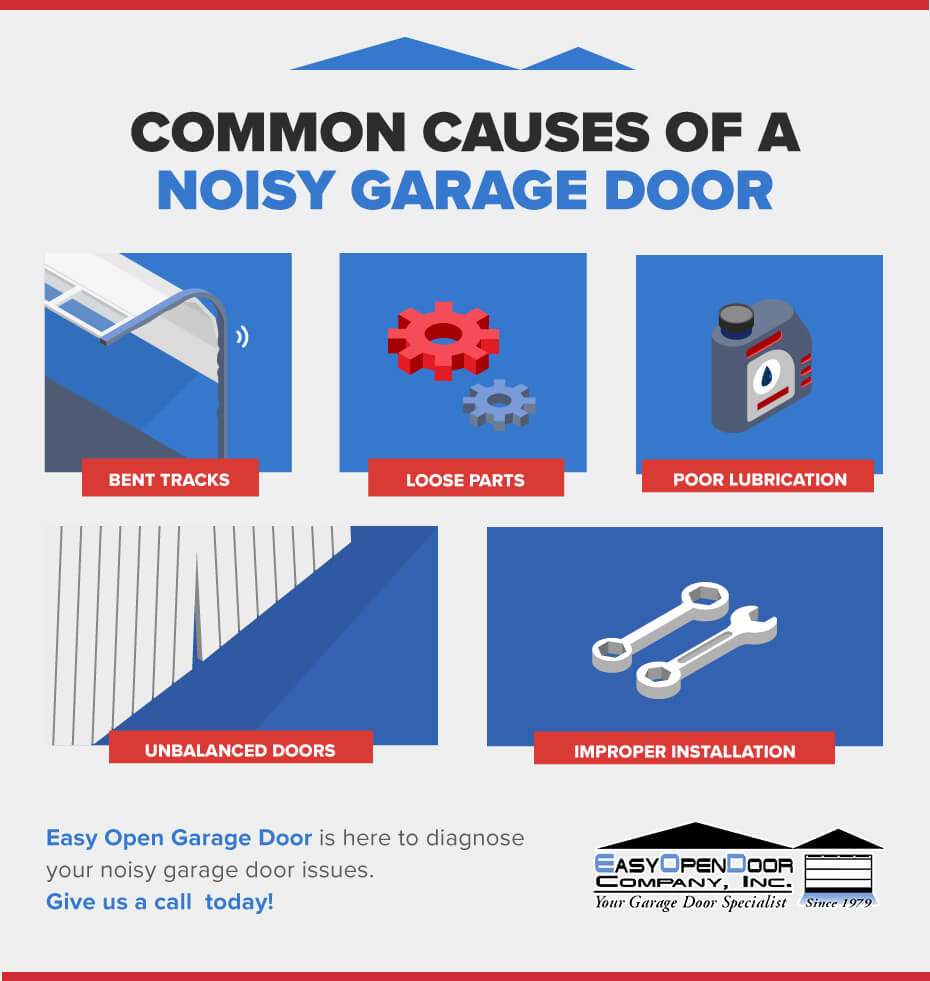Have you ever found yourself cringing every time you open your garage door because of the deafening noise it makes? You’re not alone.
A loud garage door can be more than just a minor annoyance; it can disrupt your peace and even disturb your neighbors. But why is your garage door so loud? Understanding the reasons behind the noise can help you address the issue and restore tranquility to your home.
We’ll dive into the common causes of noisy garage doors and offer practical solutions to help you enjoy a quieter, smoother operation. Whether it’s a simple fix or a sign of a larger problem, you deserve to know what’s going on. Keep reading to discover how you can transform your garage door from a clanging nuisance into a silent, efficient entryway.
Common Causes Of Garage Door Noise
Is your garage door waking up the neighborhood every time it opens? You’re not alone. Many homeowners face the same issue. Understanding the common causes of garage door noise can help. It might save you from costly repairs. Let’s dive into some typical reasons behind the racket.
Worn Out Rollers
Rollers help the door glide smoothly. Over time, they wear out. This causes friction. When rollers deteriorate, your garage door grinds. Metal rollers are often louder than nylon ones. Replacing them can reduce noise significantly.
Loose Hardware
Garage doors have many moving parts. Bolts, screws, and hinges can loosen. This leads to rattling and clanking sounds. Regularly check and tighten loose hardware. It might just quiet things down. A quick tightening can make a big difference.
Lack Of Lubrication
Garage doors need lubrication. Without it, parts rub together noisily. Tracks, springs, and rollers need attention. Lubricate them every few months. It ensures smoother operation. You might find this simple fix solves many noise issues.
Misaligned Tracks
Tracks guide the door’s movement. If misaligned, the door struggles to move smoothly. This causes grinding and screeching sounds. Check for gaps or bends in the tracks. Realigning them can restore smooth operation. It often quiets the door considerably.

Credit: infinitygarage-doors.com
Identifying Specific Noise Types
Garage doors can sometimes be unexpectedly loud. Identifying specific noise types helps pinpoint issues. Noticing different sounds can guide you to solutions. Let’s dive into the common noises you might hear.
Grinding Sounds
Grinding noises often signal problems with the garage door’s moving parts. This sound may come from worn-out rollers. Or it might be due to the door’s tracks being misaligned. Check for dirt or debris in the tracks. Cleaning them might reduce the grinding noise. Sometimes, lubrication of the rollers solves the issue. Ensure the garage door opener is working smoothly. It could be the source of the grinding sound.
Squeaking Noises
Squeaking noises are usually a result of poor lubrication. Hinges and rollers might be dry. Applying lubricant can reduce squeaking. Ensure all metal parts are well-lubricated. Squeaks can also come from loose bolts. Tightening them might stop the noise. Regular maintenance often prevents squeaks. Keep an eye on the springs too. They might need lubrication.
Rattling Or Banging
Rattling or banging sounds may indicate loose parts. Check the nuts and bolts. Ensure they are tight and secure. The door panels might be misaligned. Fixing their alignment can reduce banging. Springs can cause rattling if they are loose. Inspecting them for wear can be helpful. Sometimes, the tracks might be the problem. Ensure they are firmly attached to the wall.
Diy Solutions For Reducing Noise
Is your garage door too noisy? Simple DIY solutions can help. Regular maintenance, lubricating moving parts, and checking for loose bolts can reduce noise. These easy fixes make your garage door quieter, improving the comfort of your home without professional help.
Is your garage door waking up the neighborhood? You can fix it. Try some simple DIY solutions. They’ll help reduce that annoying noise.Tightening Loose Parts
Loose nuts and bolts cause rattling sounds. Regularly check and tighten them. Use a wrench for a snug fit. Avoid over-tightening to prevent damage.Lubricating Moving Components
Lubrication reduces friction. It keeps your garage door moving smoothly. Apply a silicone-based spray on hinges, tracks, and springs. Wipe off any excess. This simple step can make a big difference.Replacing Faulty Rollers
Worn-out rollers create loud noises. Inspect them for signs of wear. Replace them with nylon rollers. They are quieter and last longer. This upgrade will significantly reduce noise. `When To Call A Professional
A noisy garage door might need expert attention. Persistent grinding or screeching sounds can signal mechanical problems. Calling a professional ensures safe and effective repairs.
Experiencing a loud garage door can be more than just a nuisance. It might signal underlying issues that need immediate attention. While some noise problems might be easily fixed with a little DIY, there are times when calling a professional is the best choice. But how do you know when to make that call?Complex Repairs
When dealing with complicated repairs, it’s wise to call in an expert. If your garage door is making unusual noises due to malfunctioning springs or misaligned tracks, it’s not something you should tackle alone. These components require specialized tools and knowledge. Attempting to fix them without expertise can lead to further damage or costly mistakes. When my garage door springs snapped last winter, I thought I could replace them myself. After hours of frustration, I realized I was in over my head. A professional had the job done in under an hour. What seemed simple turned out to be far more complex than I anticipated.Safety Concerns
Your safety should always be a priority. A noisy garage door might indicate a risk, like a failing motor or weakening cables. These issues can be dangerous if handled improperly. Professionals have the experience to address these safety concerns without putting anyone at risk. Think about it: Is saving a few bucks worth the potential harm? If you suspect a safety hazard, don’t hesitate to contact a professional. Your peace of mind is priceless, and trained technicians know how to handle these situations safely.Regular Maintenance Checks
Regular maintenance can extend the life of your garage door and prevent noise issues. Professionals can spot problems before they become serious, saving you time and money. Consider scheduling annual checks with a trusted service. They can perform routine tasks like lubricating moving parts and tightening loose bolts. These simple actions can prevent annoying sounds and costly repairs down the road. Why wait for your garage door to become unbearably loud before taking action? Regular maintenance by a professional keeps your door running smoothly and quietly. In short, knowing when to call a professional is crucial for maintaining a quiet, safe, and efficient garage door. So, when should you pick up the phone? When the repair is complex, safety is at risk, or it’s time for a routine check-up.Preventative Measures For Quiet Operation
A noisy garage door can be a real nuisance. It disrupts the peace of your home. Taking some simple steps can help ensure quieter operation. These preventative measures not only reduce noise. They also extend the life of your garage door.
Regular Maintenance Schedule
Schedule regular maintenance to keep your garage door quiet. Inspect the door every few months. Look for loose parts and tighten them. Check the tracks, springs, and rollers. Lubricate moving parts to reduce friction. Clean the tracks to remove dust and debris. This prevents unnecessary noise.
Choosing Quality Parts
Choose quality parts for a quieter garage door. Opt for nylon rollers. They are quieter than metal ones. Consider high-quality door openers. They often come with noise-reduction features. Invest in sturdy hinges and springs. They ensure smooth and silent operation.
Upgrading To Quieter Models
Consider upgrading to a quieter garage door model. Belt-drive openers are quieter than chain-drive ones. Insulated doors also reduce noise. They provide a barrier against outside sounds. Choose doors with a rubber seal. It minimizes noise during opening and closing.

Credit: www.precisiondoor.net
Evaluating Long-term Solutions
A loud garage door can be frustrating. It disrupts the peace at home. Evaluating long-term solutions is crucial. It helps maintain a quiet environment. Let’s explore effective ways to reduce noise.
Investing In Insulation
Insulation reduces noise from your garage door. It absorbs sound vibrations. Adding insulation panels is a great start. It keeps the garage warmer too. This also helps in energy conservation. Choose high-quality materials for better results.
Insulated doors are available in the market. They offer a quieter operation. They also enhance the door’s lifespan. This is a worthy investment for lasting peace.
Soundproofing Techniques
Soundproofing makes a big difference. Install rubber seals around the door. They prevent noise leakage. Use noise-reducing mats on the floor. This minimizes sound echoes.
Consider acoustic panels on walls. They absorb excess noise. These panels are easy to install. Soundproofing creates a calm atmosphere. It turns your garage into a quieter space.

Credit: www.easyopendoor.com
Frequently Asked Questions
Why Is My Garage Door Making Loud Noises?
Garage doors make loud noises due to worn-out rollers, lack of lubrication, or loose hardware. Regular maintenance helps.
How Can I Reduce My Garage Door Noise?
Lubricate the moving parts, tighten loose bolts, and replace worn-out rollers. This reduces noise effectively.
What Parts Of A Garage Door Cause Noise?
Springs, hinges, rollers, and tracks often cause noise. Regular checks help identify the noisy parts.
Should I Be Worried About A Noisy Garage Door?
A noisy garage door might indicate a problem. Ignoring it can lead to bigger issues later.
Can Insulation Help Reduce Garage Door Noise?
Yes, insulation can absorb sound. It makes the garage door quieter and improves energy efficiency.
Conclusion
Your garage door should not be loud. Regular maintenance can help. Check for loose parts and lubricate moving parts. Tighten screws and bolts. Listen for unusual noises. They might signal a problem. Consider professional help if noise persists. A quiet garage door is important.
It ensures peace and safety. Keep your door in top shape. Simple steps can prevent major issues. Enjoy a quieter home environment. Take action today for lasting results.





